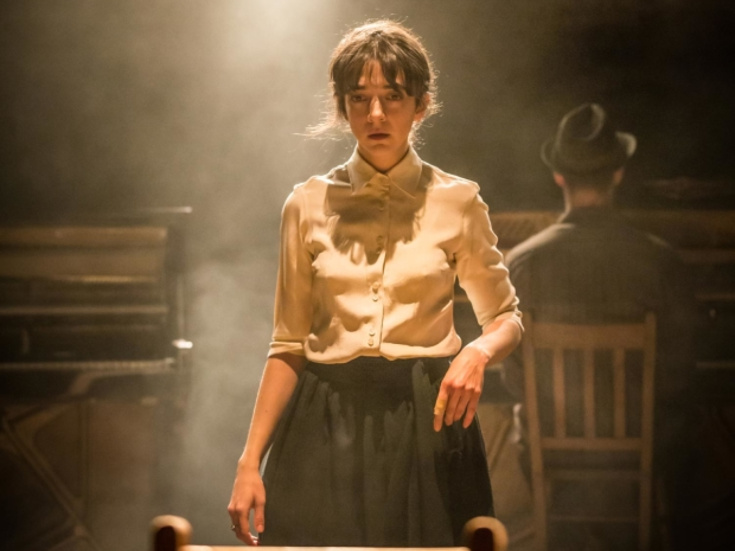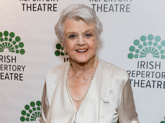Summer and Smoke Star Patsy Ferran on American Voices, Working with Angela Lansbury and More

(Photo: Marc Brenner)
Patsy Ferran was barely out of the prestigious London drama school, RADA, when she proved that she could steal a scene or two from none other than Angela Lansbury in the 2014 West End revival of Blithe Spirit. Since then, the gifted performer has done Shakespeare (Celia, Portia) as well as the one-woman Royal Court play My Mum’s a Twat and is currently leading the acclaimed Almeida Theatre revival of Summer and Smoke in its commercial transfer to the Duke of York’s Theatre. Broadway.com caught up with the fast-rising Ferran to check in on reinventing a classic and discovering a Broadway legend or two along the way.
Isn’t this your first-ever commercial transfer?
It is. We finished the play at the Almeida last spring so what I had forgotten until we got back in the rehearsal room was how in love I am with this play and how exciting it has been to fit it into the Duke of York’s. I’m quite moved, actually, that I get to do Summer and Smoke again. Everything we do in this industry goes by so quickly and can suddenly already be a memory, so to be able to live something again is very special.
Did you know Tennessee Williams' lesser-known play already?
I didn’t know it all until I got a call from my agent. I’d heard that the Almeida was doing a rehearsed reading over three days and would I be interested, so I ordered the play on Amazon and read it and didn’t especially like it. I thought, “Oh God, these people are so unlikable but I’ll do it anyway.”
When did your opinion change?
On the first day of the reading, we got presented with a different script containing two scenes I hadn’t read before, including the prologue when [central characters Alma Winemiller and John Buchanan] were 10. In my opinion, that informs the rest of the play, and from that point onward, I thought, “dear God, this play is sensational. I think I’ve fallen in love with this play and this part.”
Did that lead immediately to a full production?
Ours was just a rehearsed reading but I suddenly went, “Oh my God, if this has a future life, I might want to do it”—I say “might” because I didn’t want to set myself up for disappointment. I then got a call a few months later that the Almeida was going to do Summer and Smoke in about six months time, and I thought, “This is a no-brainer: 1200% yes!”
What do you make of the bare-bones aesthetic of your production, which favors an array of pianos over conventional scenery?
It can feel very exposing and vulnerable because all you have is the text. But what Rebecca [Frecknall, the director] has done is strip everything non-essential away, which I think Tennessee Williams encouraged: he has such a poetic soul that I think he would be very proud of the production we’re offering.
Did you go to the part of the southern U.S. where the play takes place?
Yes. Before we began rehearsals the first time around, I had about a month off and so decided to go to Mississippi with my dad for six days. We landed in Chicago for the connecting flight and I was sort of in a state of shock at the amount of American voices I heard! It’s one thing hearing [the accent] every day on TV or YouTube but it’s a whole different thing being in it.
What was it like being in Alma Winemiller territory?
After being in Clarksdale [the Mississippi town where the play is set], it made utter sense to me that Alma fixates on John [Buchanan, the doctor’s son played here by Matthew Needham] because, really, there’s no one else for her in this tiny town that you can walk the entirety of in half an hour. I wasn’t sure if a trip like this would be of any value to me but I’ve now decided that if I ever have the time and the means to do so, I’m going to try and do this for every job I have because it is so valuable.
Had you performed any Williams previously?
No, this is my Tennessee Williams debut, but in my first third-year production at drama school in front of the public, we did a contemporary of Williams’—Jane Bowles’ play In the Summer House [from 1953]. I read up on her and saw where they cited Tennessee in reference to her work, and you can see the connection between the two.
Have you had time yet to catch your former As You Like It castmate, Rosalie Craig, in her starring role in the West End revival of Company? [Craig played Rosalind to Ferran’s Celia at the National Theatre in 2015.]
No, but I will, I will! Luckily, they do Thursday matinees, which we don’t, and I am so excited about seeing it. I’m not a huge musical connoisseur but I do love that musical, so to see Rosie do Company and on top of that, Patti LuPone—I mean, are you serious?
How do you know of Patti?
The first time I ever went to New York was when I was about 18 and was to visit a friend who was studying out there. During a day I had to myself, I tried to go and see Equus with Dan Radcliffe but noticed that there was this thing over the road called Gypsy, which I’d never heard of and hadn’t seen.
What did you make of it?
My main memory is mainly Patti. I was like, “Who on earth is that?” I was crying so hard that my tissue turned to dust!
Speaking of Broadway legends, what was it like for you right out of drama training to play the maid opposite Angela Lansbury’s Madame Arcati in Blithe Spirit?
You know, I sort of feel like that experience happened to someone else. I got so spoiled on that job because I assumed that this is what it was going to be like for all the other plays I ever do. Angela for me was Murder She Wrote, which I was a big fan of with my mum, but I hadn’t realized in my ignorance what a big deal it was that she had come back to the West End [after a 40-year absence].
What was that like?
We had standing ovations every evening and sold-out shows and flocks of people outside the stage door: I had never seen anything like it. It was dreamy—that’s the only word I can really use. And Angela didn’t carry an ounce of ego with her; the kindness and generosity on that production began at the top.
Lastly, how have you responded to seeing your face in the Summer and Smoke posters all over town?
Luckily, we’re in shadow, which is quite good. I do tend to see [the poster] on tube escalators quite a lot. Not long ago I was with my mum and my sister who I saw had clocked it but didn’t say anything so I thought I’ll leave it—and then my sister jabbed me on the shoulder and my mum started going, “That’s my daughter!” END
